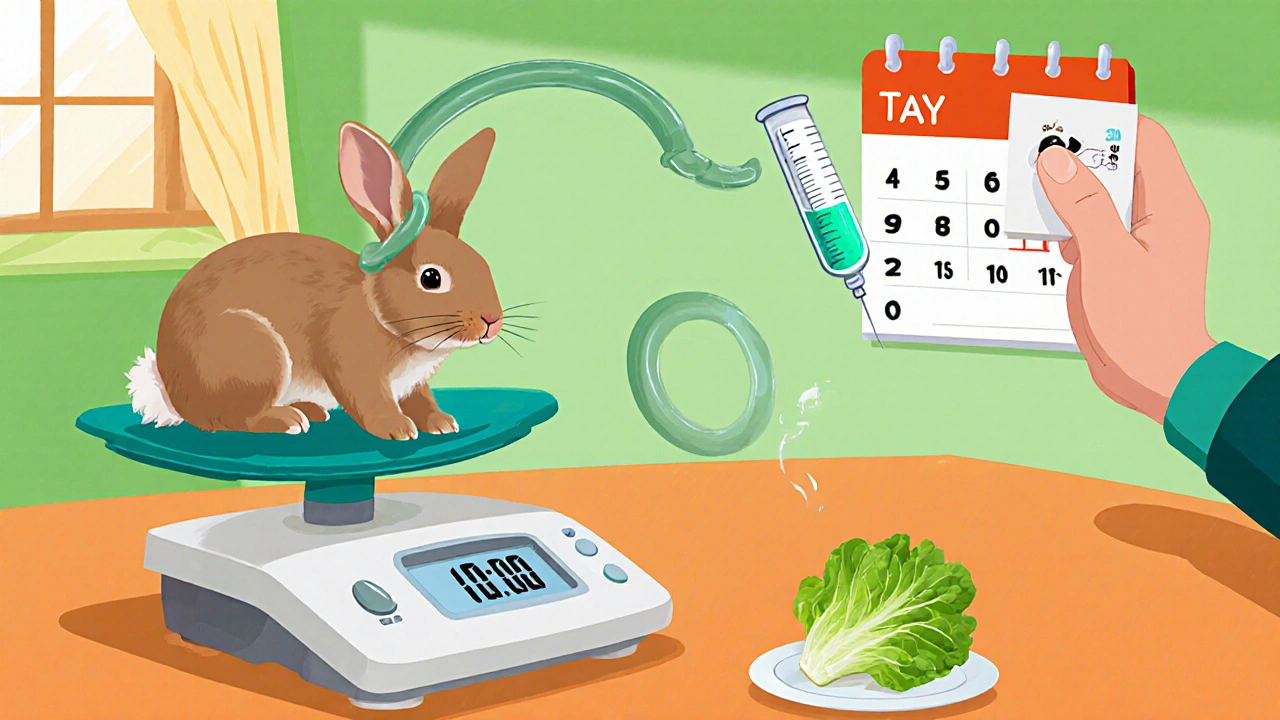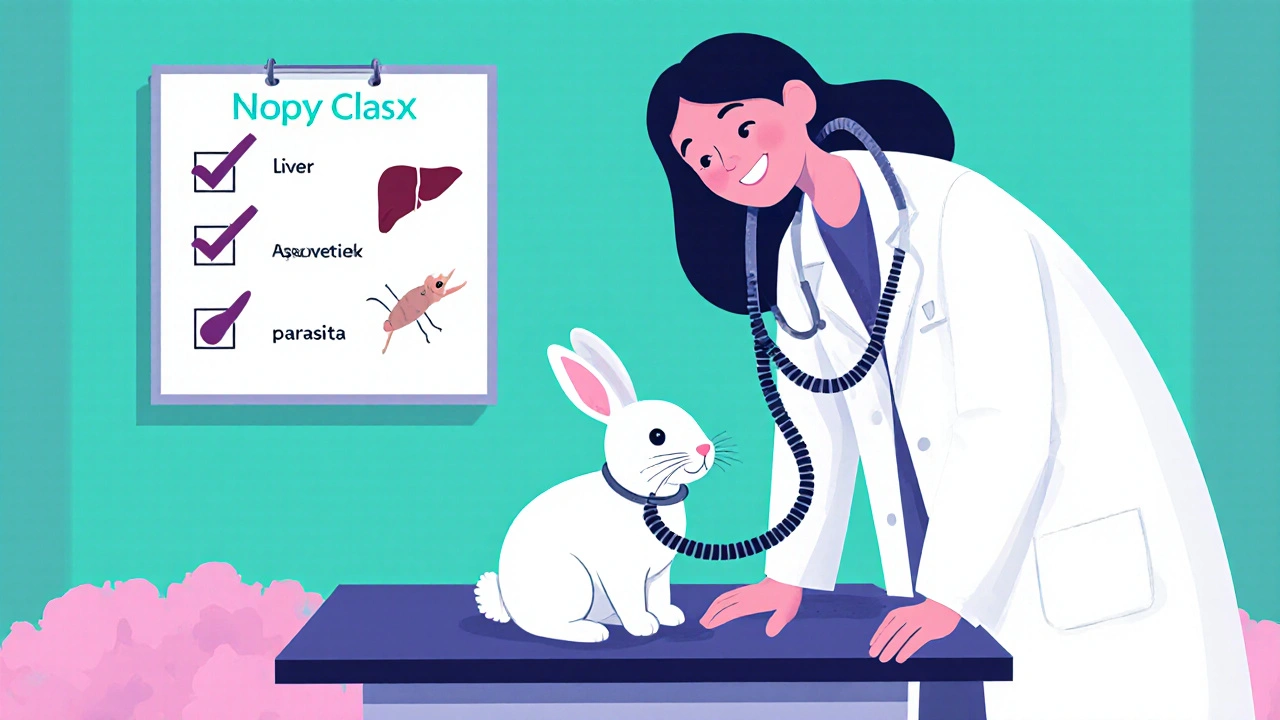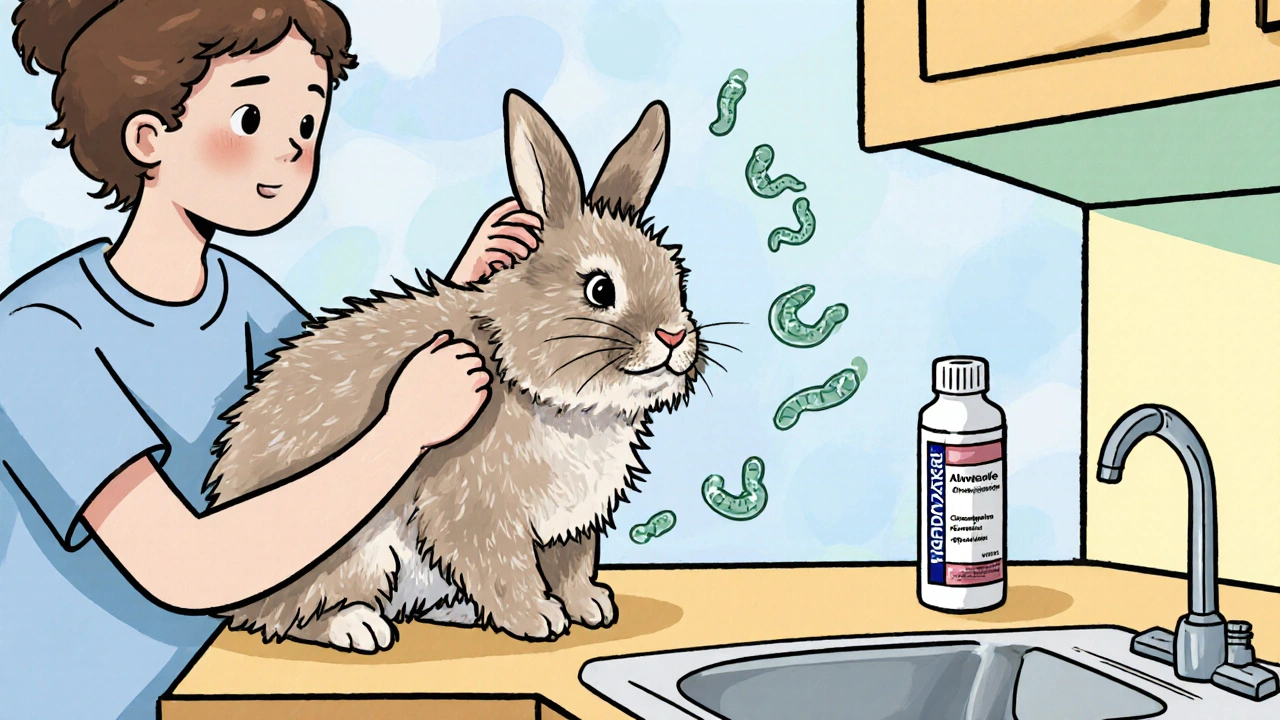Albendazole Dosage Calculator for Rabbits
This calculator determines the appropriate albendazole dosage for your rabbit based on its weight. The recommended dosage is 5 mg/kg body weight once daily for 3 consecutive days. Always consult with a veterinarian before administering any medication.
Important Safety Information
Albendazole can stress the liver. Monitor your rabbit for:
- Loss of appetite (24-48 hours)
- Softened stools or mild diarrhea
- Occasional lethargy
STOP treatment immediately if you observe: vomiting, severe weight loss, or jaundice. Consult your veterinarian right away.
Special considerations:
- Not recommended for pregnant rabbits or kits under 4 weeks old
- Always weigh your rabbit on a digital scale (round to nearest 0.1 kg)
- Use a calibrated veterinary syringe for precise measurement
When your rabbit starts scratching, losing appetite, or showing a dull coat, worms could be the hidden culprit. Albendazole is a broad‑spectrum anthelmintic that veterinarians trust to clear many common rabbit parasites. Below is a step‑by‑step guide that helps you decide when to use it, how to dose safely, and what to watch for after treatment.
Key Takeaways
- Albendazole targets roundworms, tapeworms, and some coccidia in rabbits.
- Correct dosage is 5 mg/kg body weight once daily for three consecutive days.
- Monitor liver enzymes and appetite; stop if vomiting or severe lethargy occurs.
- Alternative dewormers include fenbendazole and praziquantel, each with specific strengths.
- Always consult a qualified Veterinary clinic before starting any medication.
Why Worms Matter for Rabbits
Rabbit gastrointestinal health is fragile. A light worm load might be invisible, but heavy infestations can cause intestinal blockage, anemia, and poor weight gain. The most common offenders are:
- Roundworm (Nematoides) - large, spaghetti‑like parasites that live in the small intestine.
- Coccidia - microscopic protozoa that damage the intestinal lining, leading to diarrhea.
- Tapeworm (Cestoda) - flat, segmented worms that can cause weight loss.
Identifying the exact species often requires a fecal float test at a veterinary clinic. Until you have results, a broad‑spectrum drug like albendazole can address most of these threats.
What Is Albendazole?
Albendazole belongs to the quinoline‑carbamate family of anthelmintics. It works by binding to the parasite’s tubulin proteins, disrupting microtubule formation, and ultimately starving the worm of glucose. Because it targets a fundamental cellular process, it’s effective against a wide range of helminths and some protozoa.
How Albendazole Works in Rabbits
The drug is absorbed through the intestinal wall and reaches peak blood levels within 2-3 hours. Once inside the parasite, it blocks the conversion of glucose to energy, leading to paralysis and death within 24 hours. The dead worms are then expelled naturally with the rabbit’s feces.

Dosage Guidelines
Accurate dosing hinges on knowing your rabbit’s current weight. A small dwarf rabbit (≈1.2 kg) needs roughly 6 mg total, while a larger New Zealand White (≈3.5 kg) requires about 17 mg.
| Weight (kg) | Dosage per day (mg) | Duration |
|---|---|---|
| 0.8 - 1.5 | 4 - 8 | 3 days |
| 1.6 - 2.5 | 8 - 12 | 3 days |
| 2.6 - 3.5 | 12 - 18 | 3 days |
| 3.6 - 4.5 | 18 - 22 | 3 days |
Give the dose orally, either mixed with a small amount of fresh greens or dissolved in a syringe‑friendly liquid. Avoid crushing the tablets; they are formulated for proper release in the gut.
Administration Tips
- Weigh your rabbit on a digital scale; round to the nearest 0.1 kg.
- Calculate the exact milligram amount using the chart above.
- Measure the drug with a calibrated veterinary syringe.
- Offer a tiny piece of romaine lettuce or carrot to mask the taste.
- Observe the rabbit for 30 minutes after dosing to ensure it swallows fully.
If a dose is missed, give it as soon as possible and continue the schedule; do not double‑dose.
Safety and Side Effects
Albendazole is generally safe for adult rabbits, but it can stress the liver. Common, mild reactions include:
- Transient loss of appetite (24-48 hours).
- Softened stools or mild diarrhea.
- Occasional lethargy.
Serious signs-such as vomiting, severe weight loss, or jaundice-require immediate veterinary attention. Pregnant does and kits under 4 weeks old are especially vulnerable; many vets prefer Fenbendazole for those cases because it has a lower hepatic burden.

Comparing Albendazole with Other Rabbit Dewormers
| Drug | Primary Targets | Typical Dose | Safety Notes |
|---|---|---|---|
| Albendazole | Roundworm, tapeworm, coccidia | 5 mg/kg once daily for 3 days | Watch liver enzymes; not for pregnant does |
| Fenbendazole | Roundworm, hookworm, coccidia | 50 mg/kg once daily for 5 days | Gentler on liver; safe for breeding females |
| Praziquantel | Tapeworm only | 5 mg/kg single dose | Highly specific; no effect on roundworms |
Choose the drug that matches the parasite profile confirmed by your vet’s fecal exam. For mixed infections, albendazole’s broad coverage often makes it the first‑line choice.
When to Call a Veterinary Clinic
Even if you administer albendazole correctly, a professional assessment ensures you’re not missing other health issues. Schedule a visit if you notice any of the following:
- Persistent diarrhea beyond 48 hours after treatment.
- Visible worms in the stool or around the perianal area.
- Signs of anemia: pale gums, rapid breathing.
- Loss of appetite lasting more than three days.
A vet can run a complete fecal flotation, run blood work to check liver enzymes, and recommend follow‑up deworming intervals-typically every 6-8 weeks for indoor/outdoor rabbits.
FAQs
Can I give albendazole to a pregnant rabbit?
No. Albendazole can cross the placenta and may cause embryonic loss. For pregnant does, veterinarians usually prescribe fenbendazole, which has a safer profile.
How long after treatment will the worms be cleared?
Dead worms are expelled within 24‑48 hours, but a repeat fecal test 10‑14 days later confirms complete clearance.
Is albendazole safe for young kits?
Kits under four weeks are especially sensitive to liver stress. Use fenbendazole or wait until they are older, unless a vet explicitly advises albendazole.
Can I mix albendazole with my rabbit’s regular food?
Yes, crush the tablet and blend it into a small portion of fresh greens. Make sure the rabbit eats the whole mixture to get the full dose.
How often should I deworm my rabbit?
For indoor rabbits with low exposure, a deworming schedule every 6-12 months is typical. Outdoor or rescue rabbits may need treatment every 2-3 months, based on fecal test results.
By following these guidelines, you can safely use albendazole to keep your rabbit healthy, happy, and worm‑free. Always keep a record of doses, monitor your pet’s behavior, and maintain regular veterinary check‑ups for the best long‑term results.
 Sep, 16 2025
Sep, 16 2025

Michael Kusold
September 16, 2025 AT 01:58Albendazole works, but watch the liver.
Jeremy Lysinger
September 19, 2025 AT 13:03Got a rabbit? Keep that dosage spot on – 5 mg per kilogram for three days straight. Mix it with a bit of lettuce so they actually eat it, and stay near the cage for the first half hour to make sure they swallow it all.
Nelson De Pena
September 23, 2025 AT 00:07Exactly, the 5 mg/kg schedule is the gold standard. Using a calibrated syringe eliminates guesswork, and timing the dose after a small meal improves absorption.
Wilson Roberto
September 26, 2025 AT 11:12When we consider the larger ethical canvas, deworming is not merely a medical act but a stewardship of the rabbit's intrinsic right to health. The parasite, while a natural component of ecosystems, becomes a burden when confined to domestic habitats where the animal lacks the ability to self‑regulate its load. Albendazole, by targeting the fundamental microtubule pathways of helminths, offers a precise intervention that respects the animal's biological integrity. Yet, the drug's hepatotoxic potential reminds us that any chemical ally must be wielded with prudence. Monitoring liver enzymes before and after treatment is not a bureaucratic hurdle but a compassionate safeguard. Moreover, the decision to use albendazole should be informed by a fecal flotation test, ensuring we are not blind‑shooting at an unseen enemy. In cases of pregnancy, the risk of placental transfer outweighs the benefits, nudging us toward fenbendazole as a gentler alternative. The dosage chart, while straightforward, demands accurate weighing – a digital scale with 0.1 kg precision is ideal. Administering the medication with a small bite of fresh greens masks any bitter taste, encouraging full ingestion. Post‑treatment observation for 30 minutes can catch regurgitation or spit‑out doses early, preventing sub‑therapeutic exposure. If a dose is missed, the protocol advises prompt catch‑up rather than a double‑dose, preserving the drug’s safety margin. The broader lesson is that responsible pet ownership blends scientific knowledge with attentive care. By documenting each dose and behavioral response, owners create a valuable history that aids future veterinary consultations. Ultimately, albendazole is a tool – effective when used wisely, harmful when used carelessly. Let us therefore treat each rabbit as an individual, with a tailored approach that balances efficacy, safety, and respect for life.
Narasimha Murthy
September 29, 2025 AT 22:17While the guide is thorough, it overlooks the potential for resistance development in helminth populations. Repeated blanket use of albendazole without periodic susceptibility testing could render the drug less effective over time. A strategic rotation with fenbendazole or praziquantel, guided by fecal culture results, would be more scientifically sound.
Samantha Vondrum
October 3, 2025 AT 09:21Excellent point about resistance. 🐰💡 Implementing a rotation schedule based on veterinary diagnostics ensures we preserve drug efficacy while maintaining rabbit health.
Kelvin Egbuzie
October 6, 2025 AT 20:26Sure, because the pharma industry is definitely not pushing albendazole on us just to make a buck. 🙄 It's all about the rabbits, right?
Katherine Collins
October 10, 2025 AT 07:30lol, maybe they just want us to keep our bunnies safe, no hidden agenda.
Taylor Nation
October 13, 2025 AT 18:35Great rundown! I’ve used albendazole on my rescued lop and saw a noticeable boost in energy within a day. Just remember to double‑check the weight and keep an eye on appetite.
Nathan S. Han
October 17, 2025 AT 05:40The transformation was almost cinematic – a once‑lethargic bunny suddenly hopping like a spring‑loaded toy. It reminded me why diligent dosing matters; the contrast between pre‑ and post‑treatment behavior was striking enough to convince even the most skeptical neighbor.
Ed Mahoney
October 20, 2025 AT 16:44Oh great, another “miracle cure” that probably hides side effects under a layer of marketing jargon.
Brian Klepacki
October 24, 2025 AT 03:49Behold, the wonder of modern veterinary pharmacology! Albendazole, the elixir of the ages, vanquishes parasites with the grace of a Shakespearean hero-except, of course, when it decides to wage silent war on your rabbit’s liver. Such drama! Yet, to the uninitiated, its modest label conceals the epic saga of microtubule disruption, metabolic starvation, and the glorious expulsion of vermin in a single, triumphant fecal cascade. Who needs mysticism when you have a tablet that turns a worm‑infested rabbit into a gleaming, hopping masterpiece?
Shermaine Davis
October 27, 2025 AT 13:53I think the guide is helpful for new owners. Just follow the steps and check with a vet.
Selina M
October 31, 2025 AT 00:58Thanks for the clear info! gonna try it out and keep an eye on my bunny.